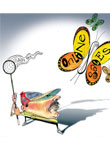 Ask Roberta Bonoff, CEO and president of Creative Kidstuff, a specialty toy store based in Minnesota, how her company has stayed in business for 30 years and she’ll tell you, “First and foremost, it’s about offering your customers and your community an experience and service they won’t find anywhere else. Second, it’s about staying relevant and staying competitive.” One way to remain competitive is to level the playing field among offline and online businesses. That’s why Bonoff, and numerous other Minnesota business groups, are working with the Minnesota Legislature on a proposal to require large online only retailers to collect sales tax at the time of purchase, something brick-and-mortar retailers are already required to do. Along with local shops, the state has much to gain. Minnesota retail businesses employ more than 17 percent of Minnesota’s employed, and it is estimated that the state loses more than $400 million from remote retail sales (House Research Department).
Ask Roberta Bonoff, CEO and president of Creative Kidstuff, a specialty toy store based in Minnesota, how her company has stayed in business for 30 years and she’ll tell you, “First and foremost, it’s about offering your customers and your community an experience and service they won’t find anywhere else. Second, it’s about staying relevant and staying competitive.” One way to remain competitive is to level the playing field among offline and online businesses. That’s why Bonoff, and numerous other Minnesota business groups, are working with the Minnesota Legislature on a proposal to require large online only retailers to collect sales tax at the time of purchase, something brick-and-mortar retailers are already required to do. Along with local shops, the state has much to gain. Minnesota retail businesses employ more than 17 percent of Minnesota’s employed, and it is estimated that the state loses more than $400 million from remote retail sales (House Research Department).
Currently, Minnesota imposes a sales tax that brick-and-mortar retailers collect at the time of purchase and remit to the state. This tax also applies to Minnesota’s E-commerce sites. “Unfortunately, some online only retailers are exploiting a loophole that allows them to avoid collecting Minnesota sales tax on these same purchases,” Bonoff points out. “Technically, online shoppers are required to report and pay online sales taxes owed on yearly taxes, but most people don’t know that. This gives online sellers a competitive advantage by not collecting the tax and creating the perception that online only purchases are tax free.”
For several months, Minnesota businesspersons have testified to the senate tax committee, held press conferences, sent numerous letters and had meetings with state senators, all in an effort to gain political support. Bonoff herself testified at the recent hearing at the State Capital in January. The latest version of their proposal is to be voted on during the session that started on March 4.
“Creative Kidstuff has enacted customer incentive programs and various toy and brand promotions to help lighten the burden and make purchases more accessible,” Bonoff adds. “Unfortunately, it’s not always enough. If a parent is able to save a few dollars on every toy purchase by avoiding taxes, they’re going to do it. We know that people are coming to our stores, finding products they love, and then going home to purchase them online at a discounted rate. That comes from the 5 to 10 percent that online retailers don’t have to pay in taxes. We’re ready to compete with anyone that is out there, we just want a level playing field,” says Bonoff.
It’s not a political issue it’s a business issue, Bonoff continues. Passing an E-fairness bill on a federal level would not only support small businesses, but local manufacturers and community organizations as well. Ultimately, if this proposal goes through on a federal level, the positive effects will filter into local communities via added revenue for retailers and the state.